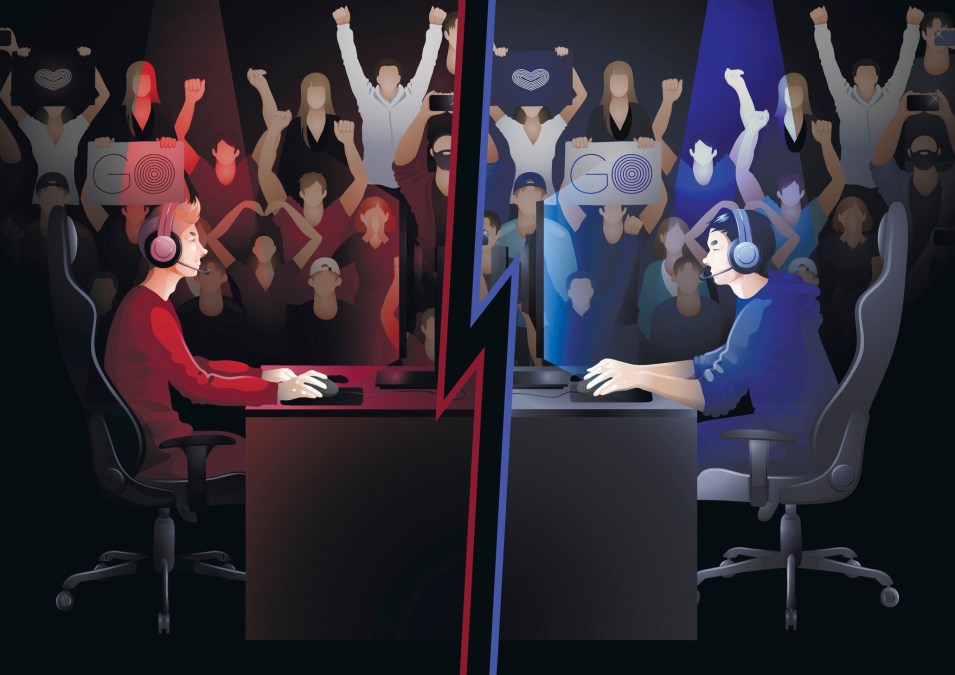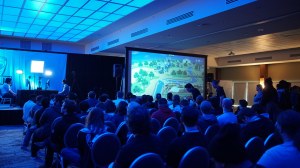How esports can build academic skills and career readiness

It may lack sweat equity, but esports, the competitive side of video gaming, is exploding in popularity in K-12 schools. The reason is that it’s not only fun, but a viable educational tool. A recent webinar hosted by edWeb.net affirms its highly positive impact on students’ academic achievements, soft skills and socio-emotional well-being.
Dennis Large, the director of educational technology for the Riverside County Office of Education, which is among the first county offices in California to facilitate an esports league, knows first-hand the power of gaming in schools.
The county jumped on the esports train to heighten student engagement, and he said schools with gaming clubs boast substantial benefits, chief among them bringing disenfranchised students — who often do not participate in school athletics — into the community to be accepted and celebrated.
“Those esports members and players carry just as much swagger, just as much social credibility as do any track stars or football or water polo stars,” Large said.
The county’s esports clubs are growing, he said, noting that some of those that started with six or seven players are now at 150 members. Recently, the county sponsored its first league tournament, in which 50 school teams competed.
Students who once couldn’t wait for the school day to end now rush to after-school esports clubs, he said, where they have friends, socialize and build community while strengthening gaming skills. Large credited esports with declining rates of truancy and tardiness.
Kevin Brown, another webinar presenter who is the esports program specialist for Orange County Department of Education and North American Scholastic Esports Federation, said esports improves students’ overall well-being and academic achievement. Not unlike traditional sports teams, esports programs set scholastic output requirements: Students must maintain specific grade point averages to participate.
Esports also bolsters fluency in science, technology and math skills, he said, as students can apply theories and formulas to in-game strategies, while also strengthening their scientific reasoning and problem-solving capabilities.
By playing games, students also gain leadership, communication and problem-solving skills that prepare them for college and career. In clubs, students are peer coaches, graphic designers, fundraisers and game strategists — roles that build career competencies.
Brown said esports also helps students learn how to win humbly, lose gracefully and even improve themselves physically. They may not be running laps, but playing games can fortify hand-eye coordination, brain function, rapid calculation and spatial reasoning skills.
Colleges also actively recruit gamers for their esports teams, courting them with substantial scholarships. More than 170 colleges and universities participate in competitive gaming, and as a professional industry, esports generated $906 million in revenue in 2018.
Esports’ growing popularity, particularly in schools, validates what students have known for a long time: that gaming is awesome… on so many levels.
About the presenters
Dr. Dennis Large is the director of educational technology for the Riverside County Office of Education. He works with the school districts in Riverside County as they implement programs such as online and blended learning, personalized learning and California State Standards and assessments. He is proud to have played an integral role in developing the Leading Edge Certification program, the Technology Leadership Network, the Riverside County Google Camp and the Riverside County Esports League. Previously, Dennis was an administrator for the Los Angeles County Office of Education for 13 years, where he did similar work around educational technology. Dennis also was a classroom teacher for 13 years, with experience in elementary, alternative education, and special education. Dennis recently completed his Ed.D. in educational technology leadership through an online program at Boise State University.
Kevin Brown thought he would be a lifelong hotelier, working with five-star properties like the Four Seasons Hotels. He found his way into education after the massive shift in the hospitality market post-9/11. Kevin taught career technical education classes (primarily hotel hospitality and management) for the Orange Unified School District in California before being recruited to open a massive hotel project in Newport Coast, California. Kevin returned to a career in technical education just in time to catch the rising tide of educational restructuring through esports, where he puts his years of experience as a gamer, classroom skills and a passion to meet kids where they are to the test every day. Kevin holds a business management degree from Argosy University and a teaching credential from California State, Long Beach. He also speaks more languages than most people have toes.
About the host
Jennifer Ehehalt is the Pittsburgh regional manager at Common Sense Education. She is responsible for helping school districts build a culture of digital citizenship among educators, students, and their families. She designs and delivers professional development for preK–12 educators that focuses on the implementation of Common Sense’s K–12 digital citizenship resources, along with how to integrate technology into the classroom. Through her work, she has had the opportunity to share best practices by presenting at ISTE, ASCD, PETE & C, IDEAcon, and GAETC.
Join the community
Digital Learning & Leadership is a free professional learning community on edWeb.net where you can share, learn, and discuss ideas and best practices to enhance teaching with technology.
The edWeb webinar referenced above, sponsored by Common Sense Education, can be found here.




